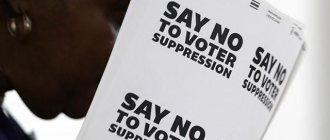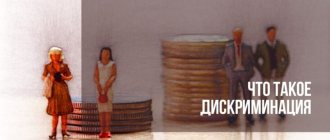Basic Concepts
Citizens who have received legal capacity within the framework of current legislation are endowed with privileges.
This is both a right and a responsibility at the same time. This is an opportunity to take part in the formation of the country's leadership at all levels. Russia has three branches of government: executive, judicial and legislative. The latter is created by electing deputies at various levels from federal to local. In addition, some important issues for society are resolved with the participation of all residents of the country. The form of the survey is a referendum. For example, Crimeans decided their fate in this way in 2014.
The right to vote is granted to a resident of a democratic country within the framework of the Basic Law. In the Constitution of the Russian Federation this is stated in Article 32.
Responsibility for violation of the electoral rights of citizens is included in two codes:
- Criminal (Article 141);
- on administrative offenses (Chapter 5).
Punishment in these laws is borne by both citizens and officials. The democratic foundations of the state presuppose the participation of every person in the formation of the power structure. This is related to the fact that a citizen has the right to vote. It is twofold:
- on the one hand, every capable person who has reached the established age can apply for an elective position;
- on the other hand, the duty and right of a citizen is to participate in the plebiscite.
For information: the intricacies of participation in a referendum are described in Law No. 67-FZ of June 12, 2002.
The protection of electoral privileges in the legal field is carried out according to the following logic:
- The criteria for nomination as candidates are described in the relevant regulations, as well as the rules for holding referendums.
- Anyone can become a candidate or vote for their favorite candidate (party).
- The right to both is protected by law: criminal liability for its violation occurs within the framework of paragraph 141 of the Criminal Code;
- administrative - according to one of the articles of the fifth chapter of the Code of Administrative Offences.
Hint: allegations of violations of election laws should be directed to law enforcement agencies.
Responsibility for violation of citizens' electoral rights
In the legal literature, three types of liability for violation of electoral rights are distinguished: constitutional and legal (sometimes called “liability under electoral law”), administrative and criminal. The last two are in the nature of sanctions, the amount of which is established respectively by the Code of Administrative Offenses of the Russian Federation and the Criminal Code of the Russian Federation. The first has a preemptive and restorative nature and is established by election laws.
The constitutional and legal responsibility of candidates and electoral associations can be expressed primarily in refusal of registration or cancellation of registration. This type of responsibility should also include the deprivation of the right to free print space and free airtime for political parties that have not paid for the previous campaign.
The constitutional and legal responsibility of election commissions may be expressed in their disbandment. The circle of initiators of disbandment is very limited: it is either a group of deputies or an election commission of a higher level, so such cases are initiated extremely rarely. In addition, the law provides only three grounds for disbanding the commission:
a) violation by the commission of the electoral rights of citizens, which resulted in the recognition of the voting results in the relevant territory or the election results as invalid;
b) failure by the commission to comply with a decision of a court or a higher commission;
c) failure by the commission to fulfill its obligation to call elections, which resulted in the calling of elections by a temporary election commission (the latter basis was introduced by Federal Law No. 93-FZ of July 21, 2005).
In fact, the commission may repeatedly violate the law, for example, by unreasonably refusing registration to candidates, but if it then “acquiesces” to the decisions of a higher commission or court, then no sanctions are provided for such actions. As noted above, this allows unscrupulous commissions to abuse their rights by delaying the registration of unwanted candidates.
In addition, it seems necessary that the election commission be held responsible for falsifications committed by individual members if the commission itself did not stop this falsification. In our opinion, falsification is impossible if the members of the commission conscientiously fulfill their duties. If they avoid performing actions provided for by law, even one member of the commission can falsify election documents (especially if he is the chairman or secretary).
The constitutional and legal responsibility of a member of the election commission can also be expressed in the termination of his powers by a court decision that found him to be systematically failing to fulfill his duties. According to our data, this measure is not used often, although many commissions have members who practically do not participate in the work of the commission. But they are usually persuaded to resign from the commission by personal application or are simply put up with their passivity. But there is a known case of termination of the powers of one of the most active members of the commission after he came out with an exposure of falsifications.
Administrative liability for offenses encroaching on the electoral rights of citizens is provided for by more than three dozen articles of the Code of the Russian Federation on Administrative Offences. The scope of administrative offenses related to elections and referendums has expanded significantly over the past three years.
The procedure for initiating a case of an administrative offense does not allow citizens to directly apply to the court with applications for administrative liability. This right is granted only to the prosecutor's office and members of the election commission authorized to do so by the commission. It is not surprising that they often apply the norms of the Code of Administrative Offenses selectively: mainly in relation to candidates and the media and much less often – to members of election commissions. Thus, we are not aware of a single case where Article 5.6 was applied – “violation of the rights of a member of an election commission, an observer”, despite numerous appeals related to such violations.
Criminal liability for crimes related to violation of electoral rights is provided for in Articles 141 and 142 of the Criminal Code of the Russian Federation, to which Articles 141.1 and 142.1 were added in 2003.
Cases of prosecution under Articles 141 and 142 of the Criminal Code of the Russian Federation are rare. For example, in the note of the Legal Department of the Central Election Commission of the Russian Federation “On the practice of bringing to criminal liability for crimes related to elections and referendums held in the Russian Federation in 2000–2002” it is indicated that during this period 204 criminal cases were initiated in Russia related to elections and referendums, of which – 41 cases under Article 141, 64 cases under Article 142 and 95 cases under other articles. 66 of these cases were completed by investigation and reached trial with an indictment. In 48 cases, the courts handed down guilty verdicts (of which only 16 cases were under Articles 141 and 142, i.e. directly related to the violation of the electoral rights of citizens). 73 people were found guilty and convicted, of whom 7 were sentenced to a fine, one to correctional labor and 65 to imprisonment, however, only one of them was sentenced to actual imprisonment (and in combination with the penalties imposed for other crimes), 41 – to probation, and 23 were given amnesty.
It is worth adding that the courts have repeatedly invalidated the election results due to violations committed by election commissions (see examples in Vladivostok, Sergiev Posad, Tutaev in 2.12.1). But despite the fact that these violations lead to such serious consequences, the perpetrators are usually not held accountable, and often not held accountable at all.
The above analysis shows that the prosecutor's office (which has the exclusive right to prosecute in these cases) and the courts do not consider crimes related to violation of electoral rights (including falsification of voting results) as having a serious public danger. This trend has not been overcome to this day. Representatives of the Central Election Commission of the Russian Federation have repeatedly expressed disagreement with this position.
Separately, it should be said about Article 141.1 of the Criminal Code of the Russian Federation, which appeared only in 2003. The article concerns violations of financing the election campaign of a candidate or electoral association on a large scale (more than 10% of the “ceiling” of the election fund, but not less than 1 million rubles). The range of punishments for these acts, which were previously considered administrative offenses, is quite wide: from a fine of 100 thousand rubles. to imprisonment for a term of two years.
Reclassifying violations of campaign finance rules as a criminal offense means that these acts are considered to pose a serious public danger. However, such no less dangerous actions as taking advantage of official or official position for the purpose of election remain administrative offenses with a maximum penalty of a fine of 50 times the minimum wage. Concealing the remaining circulation of ballot papers is also considered an administrative offense, but the illegal production of absentee certificates and concealing the remaining circulation of absentee certificates are not considered offenses at all!
In the legal literature, three types of liability for violation of electoral rights are distinguished: constitutional and legal (sometimes called “liability under electoral law”), administrative and criminal. The last two are in the nature of sanctions, the amount of which is established respectively by the Code of Administrative Offenses of the Russian Federation and the Criminal Code of the Russian Federation. The first has a preemptive and restorative nature and is established by election laws.
The constitutional and legal responsibility of candidates and electoral associations can be expressed primarily in refusal of registration or cancellation of registration. This type of responsibility should also include the deprivation of the right to free print space and free airtime for political parties that have not paid for the previous campaign.
The constitutional and legal responsibility of election commissions may be expressed in their disbandment. The circle of initiators of disbandment is very limited: it is either a group of deputies or an election commission of a higher level, so such cases are initiated extremely rarely. In addition, the law provides only three grounds for disbanding the commission:
a) violation by the commission of the electoral rights of citizens, which resulted in the recognition of the voting results in the relevant territory or the election results as invalid;
b) failure by the commission to comply with a decision of a court or a higher commission;
c) failure by the commission to fulfill its obligation to call elections, which resulted in the calling of elections by a temporary election commission (the latter basis was introduced by Federal Law No. 93-FZ of July 21, 2005).
In fact, the commission may repeatedly violate the law, for example, by unreasonably refusing registration to candidates, but if it then “acquiesces” to the decisions of a higher commission or court, then no sanctions are provided for such actions. As noted above, this allows unscrupulous commissions to abuse their rights by delaying the registration of unwanted candidates.
In addition, it seems necessary that the election commission be held responsible for falsifications committed by individual members if the commission itself did not stop this falsification. In our opinion, falsification is impossible if the members of the commission conscientiously fulfill their duties. If they avoid performing actions provided for by law, even one member of the commission can falsify election documents (especially if he is the chairman or secretary).
The constitutional and legal responsibility of a member of the election commission can also be expressed in the termination of his powers by a court decision that found him to be systematically failing to fulfill his duties. According to our data, this measure is not used often, although many commissions have members who practically do not participate in the work of the commission. But they are usually persuaded to resign from the commission by personal application or are simply put up with their passivity. But there is a known case of termination of the powers of one of the most active members of the commission after he came out with an exposure of falsifications.
Administrative liability for offenses encroaching on the electoral rights of citizens is provided for by more than three dozen articles of the Code of the Russian Federation on Administrative Offences. The scope of administrative offenses related to elections and referendums has expanded significantly over the past three years.
The procedure for initiating a case of an administrative offense does not allow citizens to directly apply to the court with applications for administrative liability. This right is granted only to the prosecutor's office and members of the election commission authorized to do so by the commission. It is not surprising that they often apply the norms of the Code of Administrative Offenses selectively: mainly in relation to candidates and the media and much less often – to members of election commissions. Thus, we are not aware of a single case where Article 5.6 was applied – “violation of the rights of a member of an election commission, an observer”, despite numerous appeals related to such violations.
Criminal liability for crimes related to violation of electoral rights is provided for in Articles 141 and 142 of the Criminal Code of the Russian Federation, to which Articles 141.1 and 142.1 were added in 2003.
Cases of prosecution under Articles 141 and 142 of the Criminal Code of the Russian Federation are rare. For example, in the note of the Legal Department of the Central Election Commission of the Russian Federation “On the practice of bringing to criminal liability for crimes related to elections and referendums held in the Russian Federation in 2000–2002” it is indicated that during this period 204 criminal cases were initiated in Russia related to elections and referendums, of which – 41 cases under Article 141, 64 cases under Article 142 and 95 cases under other articles. 66 of these cases were completed by investigation and reached trial with an indictment. In 48 cases, the courts handed down guilty verdicts (of which only 16 cases were under Articles 141 and 142, i.e. directly related to the violation of the electoral rights of citizens). 73 people were found guilty and convicted, of whom 7 were sentenced to a fine, one to correctional labor and 65 to imprisonment, however, only one of them was sentenced to actual imprisonment (and in combination with the penalties imposed for other crimes), 41 – to probation, and 23 were given amnesty.
It is worth adding that the courts have repeatedly invalidated the election results due to violations committed by election commissions (see examples in Vladivostok, Sergiev Posad, Tutaev in 2.12.1). But despite the fact that these violations lead to such serious consequences, the perpetrators are usually not held accountable, and often not held accountable at all.
The above analysis shows that the prosecutor's office (which has the exclusive right to prosecute in these cases) and the courts do not consider crimes related to violation of electoral rights (including falsification of voting results) as having a serious public danger. This trend has not been overcome to this day. Representatives of the Central Election Commission of the Russian Federation have repeatedly expressed disagreement with this position.
Separately, it should be said about Article 141.1 of the Criminal Code of the Russian Federation, which appeared only in 2003. The article concerns violations of financing the election campaign of a candidate or electoral association on a large scale (more than 10% of the “ceiling” of the election fund, but not less than 1 million rubles). The range of punishments for these acts, which were previously considered administrative offenses, is quite wide: from a fine of 100 thousand rubles. to imprisonment for a term of two years.
Reclassifying violations of campaign finance rules as a criminal offense means that these acts are considered to pose a serious public danger. However, such no less dangerous actions as taking advantage of official or official position for the purpose of election remain administrative offenses with a maximum penalty of a fine of 50 times the minimum wage. Concealing the remaining circulation of ballot papers is also considered an administrative offense, but the illegal production of absentee certificates and concealing the remaining circulation of absentee certificates are not considered offenses at all!
Appealing violations
Not all voters understand the complexity of organizing plebiscites.
Almost all government agencies take part in the implementation of civil privileges. The rules and regulations for their activities are specified in the relevant regulatory acts on elections. For example, Law No. 121-FZ of June 24, 1999 includes the 12th chapter. Its articles (90-93) describe the procedure for filing complaints about violations during the elections of deputies to the State Duma. Voting in the Russian Federation is usually carried out on a weekend. In this regard, the prosecutor's office and courts are required to change the work schedule. These structures organize duty in such a way that citizens can bring information about violations immediately. In addition, it must be checked as soon as possible.
Important: special attention in the legislation is paid to the restoration of the violated rights of a citizen. It must be restored immediately if given the opportunity.
Complaints and appeals about violations are sent to various authorities. Most of them are addressed to the relevant election commission (EC). For example, if voting at a polling station began (ended) at the wrong time, then the territorial election commission should be informed. In addition, people can write directly to the prosecutor's office. This law enforcement agency is obliged to immediately respond to the signal and eliminate the violation.
Download for viewing and printing:
Code of Administrative Offenses dated December 30, 2001 N 195-FZ (as amended on March 7, 2018)
Federal Law of June 24, 1999 N 121-FZ
Federal Law of June 12, 2002 N 67-FZ (as amended on February 5, 2018)
Article 141 of the Criminal Code of the Russian Federation dated June 13, 1996 N 63-FZ (as amended on February 19, 2018)
Article 32 of the Constitution of the Russian Federation
Election violations during the election campaign
Violations during the collection of signatures
- violations of the procedure for collecting voter signatures
- violation of deadlines for collecting signatures
Violations during election campaigning
- violations of the election campaign procedure in SIM
- violations of the rules of election campaigning on the Internet
- violation of the procedure for providing premises for election campaigning
- violation of the procedure for election campaigning in other forms
- bribery of voters
Using an administrative resource
- raising budget funds for election campaigning for a candidate
- attracting persons who are subordinate or otherwise dependent to conduct election campaigning or participate in an election campaign
- illegal influence on voters (administrative pressure, etc.)
Violations in the work of election commissions
- violation of the procedure for filing applications for inclusion of voters in the voter list at their location
- violation of the election commission's work schedule
Violation of election campaign financing
- illegal contribution of funds to the election fund
- conducting election campaigning without financing from the election fund
Types of violations
The procedure for interaction between government agencies, the media, parties and their representatives with election commissions is strictly regulated. In addition, the actions of voters, as well as the processes:
- vote counting;
- providing information;
- transportation of ballots;
- announcement of results and more.
Each stage of the plebiscite is strictly scheduled. This was done to ensure that the results of the expression of the people's will are transparent and reliable. However, such regulation leads to the likelihood of a large number of non-compliances. Their number can be judged by the number of articles on administrative responsibility - there are 24 of them.
The most frequently encountered violations are:
- failure to provide information in a timely manner;
- refusal to grant leave to commission members and candidates for people's representatives;
- failure to comply with the ban on advertising the commercial activities of candidates;
- participation in campaigning by persons who are not permitted to do so;
- failure to provide premises for meetings with voters;
- bribery of voters.
Advice: participants in the election process need to study all the intricacies of the legislation, as they come under close surveillance:
- prosecutor's office;
- representatives of a competing political force;
- civil society.
What to write in a complaint
In an appeal regarding non-compliance with the procedure for holding a plebiscite, the following must be indicated:
- addressee (you can consult the prosecutor's office);
- individual information about the applicant;
- type of violation, indicating legal norms;
- exact details of the event: location of the incident;
- date;
- time;
- personal data of the offender;
Download for viewing and printing:
Sample application to the IC
Sample complaint to the prosecutor's office
The procedure for appealing the actions of the EC
The right to file a complaint is given not only to voters, but also to parliamentary candidates and parties. These, as a rule, see a violation of their rights in the decisions of the EC. Only the court can interfere in the activities of the latter. Consequently, the offended candidate or party is obliged to appeal the decision in court.
Hint: the level of the court is determined by the place of a particular EC in the structure of the plebiscite organization. An application for the decision of the district commission is submitted to the district court, and so on.
Election violations on voting day
Illegal campaigning
- election day campaigning
- campaigning by a member of the PEC
- campaigning (placing campaign materials) in the premises of the election commission, in the building where they are located, and at a distance of less than 50 meters from the entrance to them
Violations in the organization of voting
- obstruction of the implementation of active suffrage
- illegal delivery of voters to voting premises (transportation)
- violations during voting outside the voting premises
- coercion to vote
- ballot stuffing
- illegal issuance of ballot papers
- violation of the procedure for including voters in the voter list at their location
Violations of the rights of observers and other participants
- removal of an observer without a court decision
- obstruction of video and photography in the voting premises
- failure to issue a copy of the protocol on voting results
- information about violations of the rights of observers
Violations during vote counting and determination of voting results
- Violations of the vote counting procedure
- Violations of the procedure for recording voting results (drawing up protocols)
- Falsification of the protocol on voting results
About administrative responsibility
Each signal about a violation of the law is verified. Based on its results, the court makes a decision. The punishment depends on the type of offense. The Code of Administrative Offenses provides for penalties . For example, an employer for refusing to take leave to participate in elections will be fined from one and a half to two thousand rubles.
- If a person decides to destroy propaganda materials, he will have to pay from 500 to 1000 rubles to the treasury.
- For bribery of voters, the responsibility is more serious: citizens are fined 20 - 25 thousand rubles;
- officials - up to five hundred thousand rubles.
Hint: punishment under the Code of Administrative Offenses is applied only by the court.
Concept and classification of election disputes in the Russian Federation
The problem of election disputes is relatively new for the Russian Federation. During the Soviet period, in the absence of genuine competition, electoral disputes as a legal phenomenon were practically absent.
Adoption of the new Constitution of the Russian Federation in 1993 and fixation in Art. 2 of a person, his rights and freedoms are the highest value, enshrined in Part 3 of Art. 3 free elections as the highest expression of the power of the people, in Part 1 and Part 3 of Art. 13 ideological and political diversity, multi-party system served as the starting point for real political competition of candidates, political activity of citizens in the electoral process.
In this regard, the ongoing clashes of political interests of candidates, electoral associations in the struggle for power, the active use by citizens of the guaranteed opportunity for adequate protection and restoration of voting rights inevitably led to the accompanying phenomenon of all election campaigns - electoral disputes.
Election disputes cannot be unequivocally viewed only as a negative phenomenon due to the fact that they reveal gaps in electoral legislation, the inconsistency and conceptual inconsistency of the latter, violations in law enforcement practice, the low level of legal culture of election participants who embody legal regulations in their behavior, and this, in turn, in turn, contributes to improving the quality of electoral law.
In the Federal Law “On Basic Guarantees...” there is no legal definition of the concept of “election disputes”; the legislator uses the term “complaint of violations of the electoral rights of citizens”, which formed the basis for the name of a separate chapter X of this Law “Complaint of violations of electoral rights and the right to participate in a referendum of citizens Russian Federation and liability for violation of legislation on elections and referendums.” However, the category of “election disputes” is more multifaceted and is not limited to the procedure for appealing violated electoral rights.
In legal science, despite the wide range of author’s definitions of the concept of “election disputes,” a unified approach to this term has not been developed. We share the opinion of R. A. Okhotnikov on this issue: “election disputes are electoral legal relations of a protective nature, within the framework of which, through an appeal in the administrative (institutional) and judicial order established by the legislation of the Russian Federation, conflict situations arising in connection with real or alleged violation of the electoral rights of citizens"1.
Election disputes are traditionally classified on the following grounds:
1. For the main reasons for the occurrence of election disputes:
- violations of electoral legislation;
- incorrect application of electoral legislation;
- misinterpretation of electoral legislation.
2. By the nature of the protected electoral right:
- disputes about the protection of passive suffrage;
- disputes about the protection of active suffrage.
3. According to the procedure for resolving election disputes:
- disputes resolved in court;
- disputes resolved administratively, i.e. by election commissions.
4. By importance for the electoral process:
- disputes, the resolution of which eliminates minor violations of election legislation;
- disputes, the resolution of which significantly affects the course and results of elections (for example, refusal to register a candidate (list of candidates), cancellation of his registration).
5. On the subject of the dispute:
- calling elections;
- formation of electoral districts and precincts;
- compilation of voter lists;
- formation of election commissions;
- nomination of candidates (lists of candidates);
- the procedure for collecting signatures in support of candidates;
- refusal to register a candidate (list of candidates);
- misuse of media opportunities;
- unlawful use of official or official position;
- violation of election campaign rules;
- violation of election financing procedures;
- violation of the procedure for financing by a candidate or electoral association of his election campaign;
- cancellation of the decision to register a candidate (list of candidates);
- violation of voting procedures and procedures;
- violation of the rules for counting votes;
- recognition of elections as invalid or not held;
- issues of repeat voting, repeat elections.
The presented list of types of election disputes is not exhaustive, but we have named the most significant classification grounds.
Criminal liability
Paragraph 141 of the Criminal Code provides for the following types of punishments for violators of election legislation:
- penalties of up to RUB 80,000.0;
- compulsory work up to 360 hours;
- correctional - up to a year.
Hint: an official who interferes with the activities of an EC at any level can be imprisoned for up to four years or fined 500,000.0 rubles.
Features of the crime
The following acts fall under Article 141 of the Criminal Code:
- Object - social relations in the sphere of constitutional rights of people.
- Subject is a legally capable person who has reached the age of 16 at the time of the commission.
- The objective side is expressed in active or passive actions, the result of which is a violation of a person’s constitutional privilege.
- The subjective trait is characterized by guilt, expressed in the understanding of the wrongfulness of a decision or act.
Clue! Paragraph 141 of the Criminal Code provides qualifying factors:
- deception;
- bribe;
- compulsion;
- violence or threat of its use;
- committing:
- using official powers;
- group, including an organized one.







